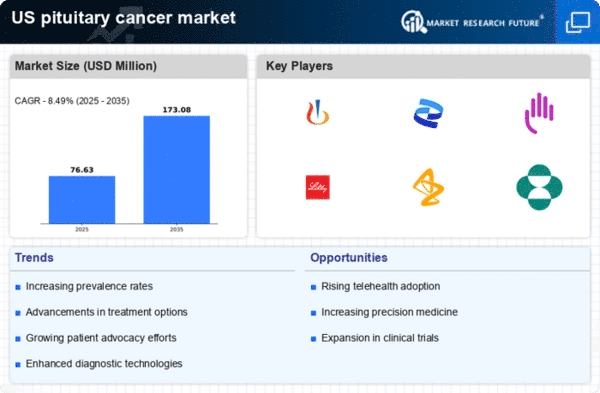Enhanced Supportive Care Services
The pituitary cancer market is witnessing a transformation in supportive care services, which are crucial for improving patient outcomes. As awareness of the complexities associated with pituitary tumors grows, healthcare providers are increasingly focusing on comprehensive care models that address not only the medical but also the psychological and social needs of patients. This shift is reflected in the establishment of multidisciplinary care teams that include endocrinologists, oncologists, and mental health professionals. Enhanced supportive care services, such as counseling and nutritional support, are becoming integral components of treatment plans. This holistic approach is likely to improve patient satisfaction and adherence to treatment regimens, ultimately benefiting the pituitary cancer market. Furthermore, the integration of telehealth services is expanding access to supportive care, particularly for patients in remote areas, thereby broadening the reach of the pituitary cancer market.
Regulatory Support for New Therapies
The pituitary cancer market is experiencing favorable regulatory support for the development and approval of new therapies. Regulatory agencies, such as the Food and Drug Administration (FDA), are increasingly streamlining the approval process for innovative treatments, particularly those addressing unmet medical needs. This trend is encouraging pharmaceutical companies to invest in research and development for new drugs targeting pituitary tumors. The introduction of expedited pathways, such as Breakthrough Therapy Designation, is likely to accelerate the availability of promising therapies to patients. As a result, the pituitary cancer market may see a surge in new treatment options, enhancing the overall therapeutic landscape. Additionally, the collaboration between regulatory bodies and industry stakeholders is fostering a more efficient development process, which could lead to improved patient outcomes and increased market growth.
Rising Incidence of Pituitary Tumors
The pituitary cancer market is experiencing growth due to the increasing incidence of pituitary tumors in the US. Recent data indicates that approximately 3 to 4 cases per 100,000 individuals are diagnosed annually, leading to a heightened demand for effective treatment options. This rise in cases is attributed to factors such as improved diagnostic capabilities and increased awareness among healthcare providers. As more patients are diagnosed, the pituitary cancer market is likely to expand, necessitating advancements in therapeutic approaches and supportive care. Furthermore, the growing population of aging individuals, who are more susceptible to various cancers, may contribute to the upward trend in pituitary tumor cases. Consequently, stakeholders in the pituitary cancer market are focusing on developing innovative therapies and enhancing patient management strategies to address this growing patient population.
Growing Investment in Cancer Research
The pituitary cancer market is benefiting from increased investment in cancer research and development. Government funding and private sector investments are directed towards understanding the molecular mechanisms underlying pituitary tumors, which may lead to the discovery of novel therapeutic targets. In the US, funding for cancer research has seen a significant rise, with the National Institutes of Health (NIH) allocating substantial resources to various cancer research initiatives. This influx of funding is likely to accelerate the development of new drugs and treatment protocols, thereby enhancing the overall landscape of the pituitary cancer market. Moreover, collaborations between academic institutions and pharmaceutical companies are fostering innovation, potentially leading to breakthroughs in treatment options. As research continues to advance, the pituitary cancer market is expected to evolve, offering new hope to patients and healthcare providers alike.
Technological Innovations in Treatment Modalities
Technological advancements are playing a pivotal role in shaping the pituitary cancer market. Innovations in surgical techniques, such as minimally invasive procedures and robotic-assisted surgeries, have improved patient outcomes and reduced recovery times. Additionally, the development of novel radiation therapies, including stereotactic radiosurgery, has enhanced the precision of treatment, minimizing damage to surrounding healthy tissues. These advancements not only improve survival rates but also contribute to a better quality of life for patients. The market is projected to witness a surge in demand for these advanced treatment modalities, as healthcare providers increasingly adopt cutting-edge technologies. Furthermore, the integration of artificial intelligence in treatment planning and monitoring may further revolutionize the pituitary cancer market, leading to more personalized and effective treatment strategies.
















